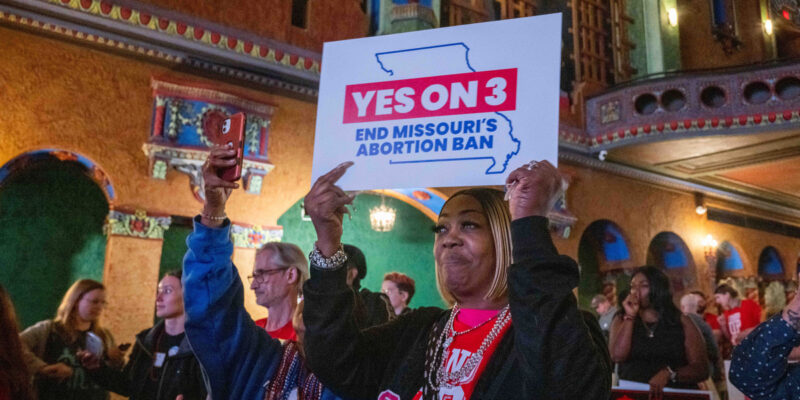
Reproductive rights groups are preparing for legal battles in several of the states where voters approved constitutional amendments to protect or expand abortion access this month.
After seven of the 10 pro-abortion rights measures on the November ballot across the country passed, the groups that backed them are now working to ensure they are implemented smoothly, particularly in states where the amendments will undo existing abortion bans.
Abortion rights groups are bracing for an especially tough fight in conservative Missouri, where they see one of the most restrictive bans in the country in place. Missouri banned almost all abortions after the U.S. Supreme Court overturned Roe v. Wade in 2022, with exceptions to protect the life of the mother and for medical emergencies.
The newly passed Amendment 3 protects abortion rights up to fetal viability, around the 24th week of pregnancy, with exceptions afterward to protect the life or health of the woman, which would mark the biggest change in the law of any state that voted on the issue this year.
Under Missouri law, the measure becomes formally enshrined in the state constitution 30 days after passage. But reproductive groups say even that doesn’t present the kind of legal security desired by abortion clinics to resume services.
That fearful posture has a couple main causes: Missouri is the first state with a near-total abortion ban to approve a constitutional amendment making abortion a fundamental right, and the GOP-led Legislature has long been hostile to abortion rights.
“Missouri is the one where the obstacles are going to be greatest,” said Olivia Cappello, who helps run state advocacy operations for Planned Parenthood’s national political arm. “The decades of restrictions and cuts to public funding for reproductive health care services, as well as the general hostility of the state government, has pushed a lot of abortion providers out of that state. So it’s going to take a while to revamp the care infrastructure there.”
Anti-abortion groups and Republican lawmakers in Missouri challenged the measure’s appearance on the ballot at every turn. As a result, despite the ballot measure’s passage, there is no expectation that lawmakers will swiftly make changes to state statutes regarding abortion access.
“Going to the courts is our fastest option, and also our most likely option to work in Missouri,” she said.
The ACLU of Missouri, together with a coalition of reproductive rights groups, has already filed litigation seeking to block the dozens of abortion restrictions on the books in the state — including the near-total ban — as part an effort to force implementation of the passed amendment.
“Missourians overwhelmingly voted to end Missouri’s abortion ban and protect reproductive freedom. Our lawsuit is the next step to fulfill the promise of the amendment,” Tori Schafer, the deputy director for policy and campaigns at the ACLU of Missouri, said in a statement.
The suit specifically asks the Missouri Supreme Court to declare the state’s abortion ban unconstitutional and seeks the legal authorization for abortion providers in the state to resume services immediately. A hearing in the case is scheduled for Dec. 4, one day before the amendment would formally take effect.
Several anti-abortion groups, including Missouri Stands with Women and the Thomas More Society, have indicated they’ll fight implementation but haven’t offered specific plans.
Kelsey Pritchard, the director of state public affairs for Susan B. Anthony Pro-Life America, a national anti-abortion group that worked against the passage of amendments in Missouri and elsewhere, said in an email that the measure’s “slim margin of victory” amounted to a “clear indication that there will be pro-life victories in Missouri’s future.”
Pritchard didn’t provide any specifics about how the group might fight implementation of the measure in the state.
Similar efforts appear imminent in Arizona, where passage of Proposition 139 created a “fundamental right” in the state’s constitution to receive an abortion up until fetal viability, with exceptions after that if a health care professional decides it’s needed to “protect the life or physical or mental health of the pregnant individual.”
Officials will formally certify all statewide elections results Monday, opening the door for prospective litigation around its implementation.
The passage of the ballot measure effectively undoes Arizona’s current abortion law — which states that abortions are legal up until the 15th week of pregnancy, with an exception after that to save the woman’s life but no exceptions for rape or incest — and contradicts what abortion rights groups say are approximately 40 other restrictions on care in state law.
For the measure to be effectively carried out, these groups plan to quickly follow the Monday certification deadline with litigation they say is designed to prompt judges to overturn the dozens of existing abortion restrictions on the books in the state. They expect the process to take months.
“The 40-plus laws that are still on the books don’t automatically disappear,” said Chris Love, a senior adviser to Planned Parenthood Advocates of Arizona. “There will need to be legal challenges to most or all of those 40 laws and regulations.”
Beyond the 15-week ban, the future of many of these abortion restrictions in the state may remain in question, despite the measure’s success.
“There are others where, potentially, an Arizona judge, likely appointed by one of our many Republican governors over the decades, would see it differently,” said Dawn Penich, a spokesperson for the ballot measure campaign. She cited a 24-hour waiting period required for women to receive abortion care in the state as an example of the kind of law that may be allowed to stand.
Despite the amendment’s passage, securing access to abortion through fetal viability “is not going to be easy and definitely not quick,” she said.
Anti-abortion groups haven’t yet filed any litigation seeking to hamper forward movement of the measure’s implementation in Arizona. At least one prominent anti-abortion organization has vowed to fight its implementation.
“We hope to bring more alongside us in the next few weeks and months to continue this battle for life. This fight is not over,” Arizona Right to Life Chair Jill Norgaard said in a statement. Her group called on “its allies in the fight against Proposition 139 to work together to overturn” it in a statement this week.
Pritchard, of Susan B. Anthony Pro-Life America, which also worked against passage of the measure in Arizona, didn’t respond to questions about the group’s future involvement around implementation in the state.
Meanwhile, no litigation on either side of the issue has yet emerged in Montana, where voters passed a ballot measure enshrining abortion in the state constitution. But abortion rights groups in the heavily Republican state said they’re prepared to respond to any.
In Montana, abortion is already legal until fetal viability, meaning there is no need for a complicated legal process to unwind any major restrictions. That has meant that abortion rights groups haven’t needed to file any affirmative litigation, and it significantly lowers the possibility of any viable challenges to the measure’s implementation.
Abortion rights groups also aren’t expecting much of a battle in Colorado, Maryland, Nevada or New York — the remaining four states where voters passed measures enshrining abortion rights in state constitutions earlier this month.
In Nevada, that’s because voters will have to pass the same measure once again in 2026 for it to take effect (under state law, such amendments must pass in two consecutive election cycles).
In Maryland and New York, abortions are already legal through fetal viability, while Colorado has no laws restricting abortion and no gestational limits for women seeking abortions. The constitutional amendments in these blue states serve almost entirely to prevent lawmakers from undoing existing protections in the future.
Voters in Florida, Nebraska and South Dakota rejected proposed amendments that would have enshrined abortion protections in their state constitutions, the first states where pro-abortion-rights ballot measures failed since the Supreme Court overturned Roe.
Reproductive rights groups said those outcomes make it clear that there remains significant opposition to abortion rights in many pockets across the country, and that they can’t take anything for granted — including in states where such measures passed.
“Ballot measures don’t end on Election Day. Ballot measure coalitions have to stay engaged long after to ensure that the policies that they passed are implemented within the spirit that they are intended,” said Quentin Savwoir, the director of programs and strategy at the Ballot Initiative Strategy Center, which works with progressive organizations to help advance citizen-led ballot measures.
Savwoir added that his group expected to see an increase in actions and legislation that would make it harder for other states to put the future of abortion rights directly in the hands of voters.
He predicted, for example, the emergence of bills in GOP-led states that mirror a Florida law that requires 60% support from voters to pass any such citizen-led ballot initiative. (The ballot measure that would have enshrined abortion rights in Florida’s constitution failed, even though it received the support of 57% of voters.)
“We are preparing for an escalation of all types of attacks on the ballot measure and initiative process itself, given the overwhelming support of our initiatives,” he said.















